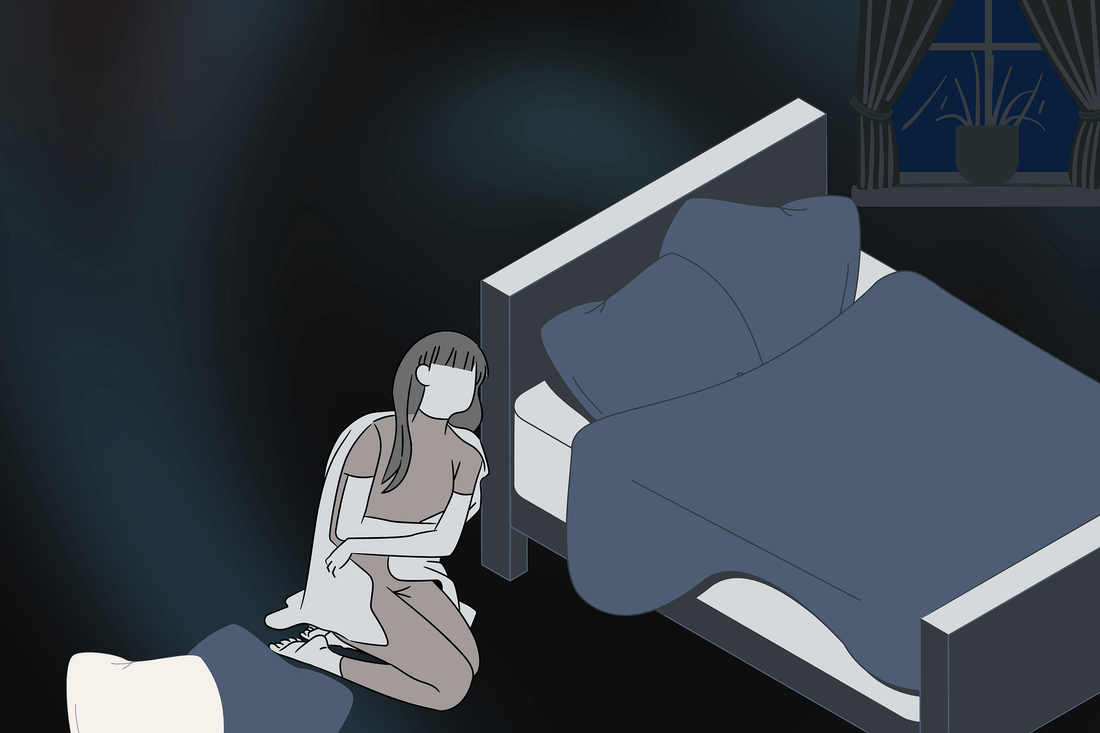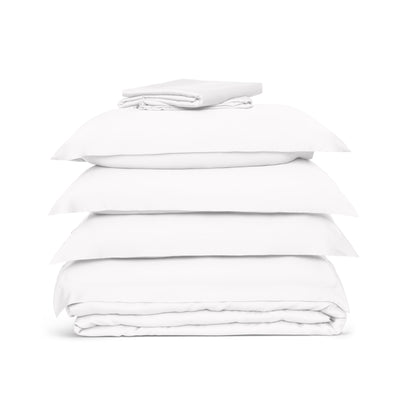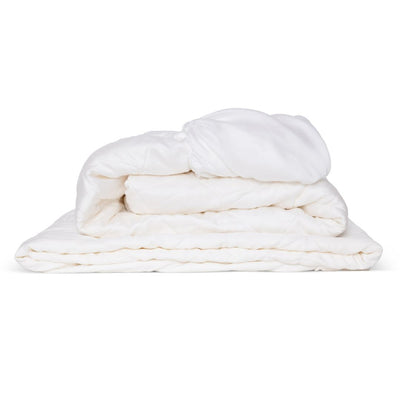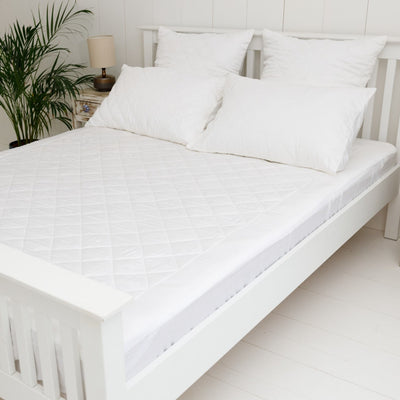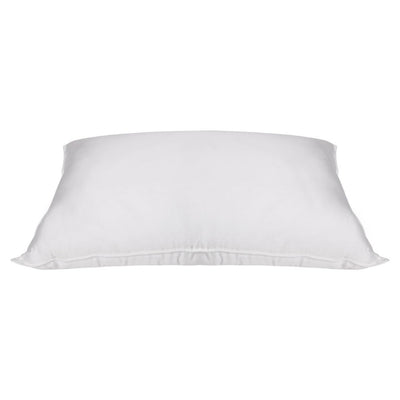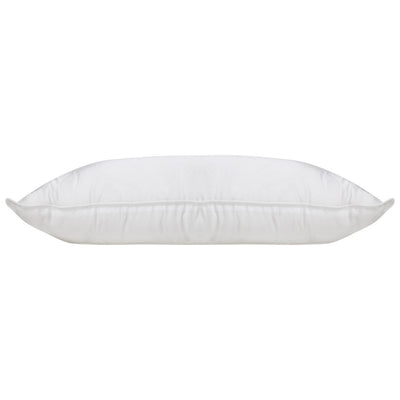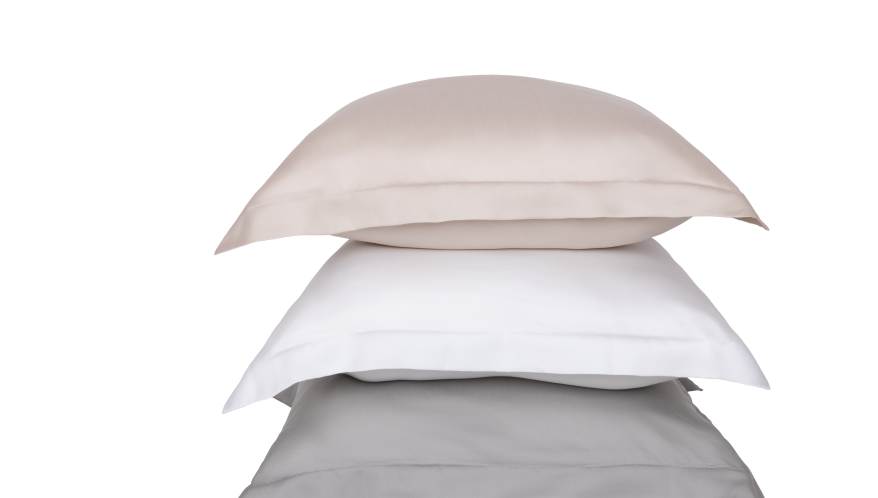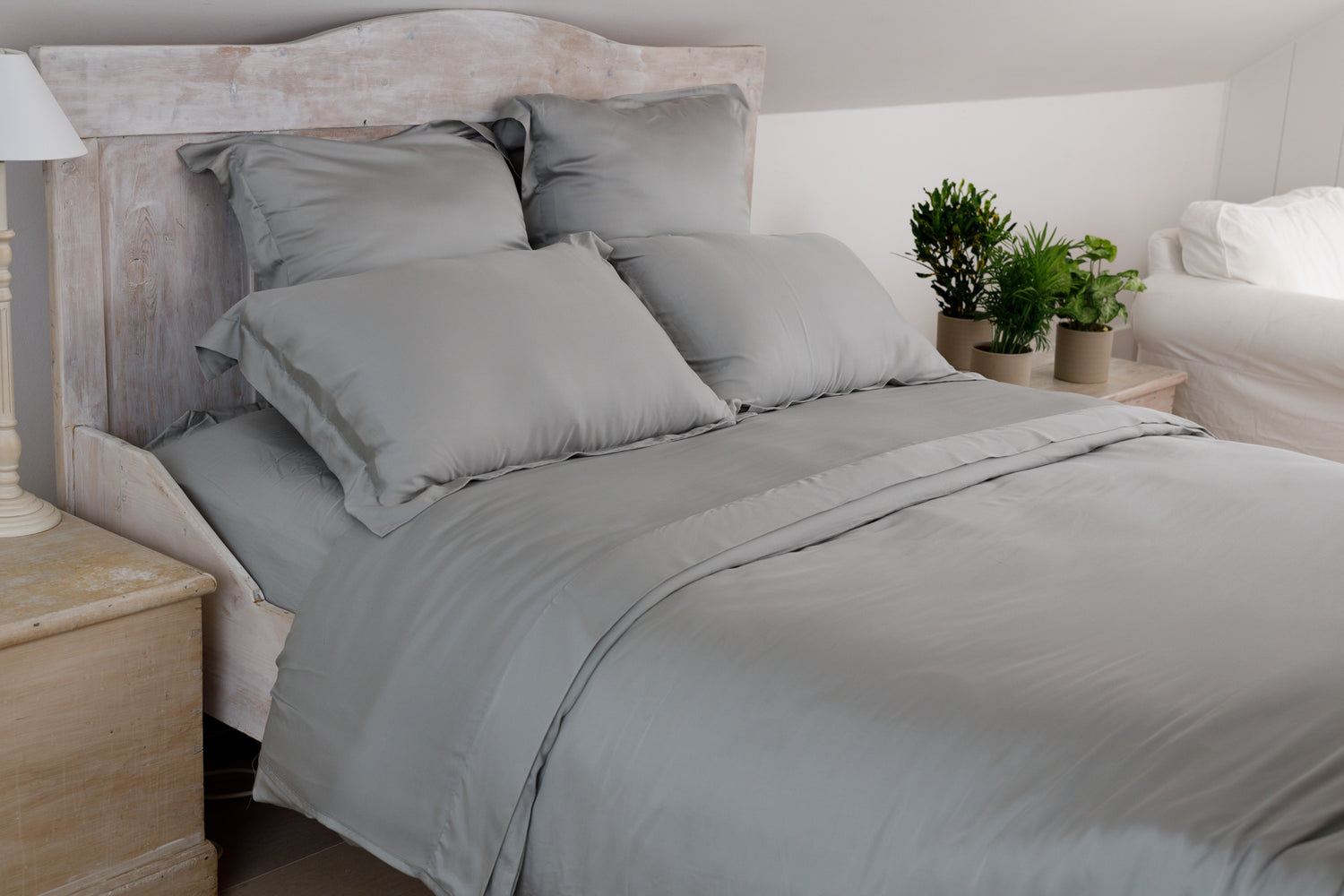While many of us may suffer from a bad night’s sleep from time to time, some people struggle with something called sleep anxiety, which can spiral into further long-term physical and mental health complications like insomnia and depression.
In this article, we’ve explained what sleep anxiety is and the symptoms, why stress often feels worse at night, and how to combat anxiety in bed.
What is sleep anxiety?
Sleep anxiety refers to feelings of uneasiness, nervousness, and panic around not being able to fall asleep and, subsequently, waking up sleep-deprived and restless the next day.
Both sleep and anxiety are closely connected, with many Brits claiming that anxiousness affects the amount of rest they receive at night. As such, bad anxiety can lead to a constant cycle of stress and sleepless nights, that then prompts further panic, worry, and physical problems.
Anxiety at night symptoms
Symptoms of sleep anxiety can vary between individuals, and severity of experiences differ from person to person. However, the most common symptoms of sleep anxiety are:
- Difficulty falling asleep and feeling wide awake
- Restlessness and nervousness
- Gastrointestinal problems (issues relating to your digestive system)
- Night terrors and nightmares
- Involuntary twitching
Additionally, a particularly serious symptom of sleep anxiety is panic attacks, which often means an increased heart rate, sweating and shortness of breath, and dizziness.
Suffering from a panic attack while trying to get to sleep, or even waking up from one during the night, can lead to further anxiety about future episodes – triggering a difficult loop to break from.
Why is my anxiety worse at night?
There are a number of reasons why you might start to feel particularly anxious at night, but one common reason is that your brain simply doesn’t have as much to think about as during the day.
While at work, for instance, you’re likely constantly cognitively stimulated, whether you’re handling customers, completing tasks, or talking to colleagues, which helps your brain to function at full capacity. At night, with much less to think about, your brain may want to continue working at that same pace, but, in the absence of stimulation, resort instead to anxious thoughts and emotions.
What happens when anxiety interrupts sleep?
The trouble with sleep anxiety goes far beyond the initial struggle of getting to sleep on any given night; extreme tiredness and sleep deprivation can have a serious knock-on effect that negatively impacts your mood, performance at work, ability to learn or engage, and react to situations.
Each of these can then lead to subsequent concerns, such as physical health problems like heart disease, high blood pressure, and obesity, or mental health concerns. In fact, research has revealed an intrinsic relationship between anxiety-induced insomnia and depression.
Ways to overcome anxiety at night
Anxiety when falling asleep can feel like a never-ending weight, especially if you’ve been suffering for quite a while. However, while it can be difficult to know how to stop anxious thoughts at night, there are some simple steps you can take to try and alleviate your stress – although if the problem persists, you should always seek the advice of a medical professional.
Limit screen time before bed
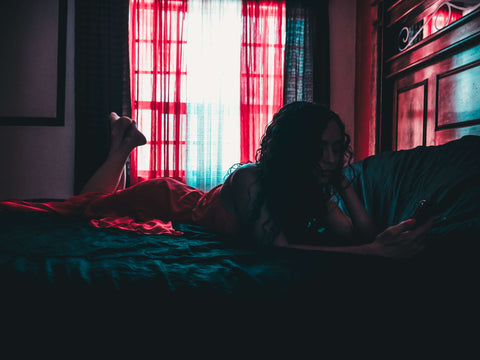
You might not realise, but electronic devices like smartphones, TVs, tablets, and laptops emit something called ‘blue light’. This blue light interrupts your body’s production of melatonin (the hormone that controls your circadian rhythm), which makes it both more difficult to fall asleep at night and wake up refreshed in the morning.
This negative affect on your sleep cycle can then trigger sleep anxiety and worry, making it even harder to relax your mind and drift off into a comfortable slumber. It’s generally recommended to stop using electronic devices around 30 minutes before bed, so consider setting a reminder to switch your screens for a book or music instead.
Daily exercise
Exercise has long-been proven to improve mood and reduce feelings of depression, stress, and, importantly, anxiety. If you’re experiencing anxiety falling asleep, consider introducing exercise into your daily routine, whether that be in the morning before work, over your lunch break, or when you get home in the afternoon.
Getting moving throughout the day can also help to improve your circadian rhythm, if bad anxiety at night has led to you suffering from an erratic sleep pattern. However, one thing to be aware of is to not exercise too late in the day, as you’ll likely raise your heart rate and stimulate your nervous system, which can make it difficult to fall asleep when you head to bed.
Practice meditation before bed
Rather than exercising just before bed, it can be helpful instead to practice meditation. Not only does this help to increase melatonin and serotonin (the hormone that controls your mood – often considered the happy hormone), but it’s also an effective way of control your breathing – which can lead to significant reductions in experienced night time anxiety.
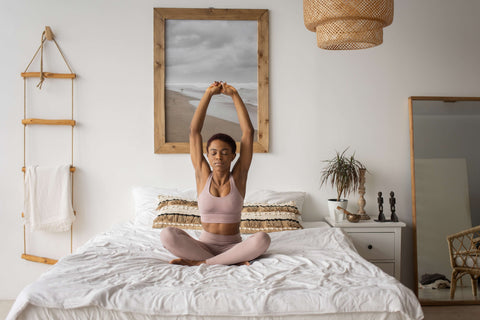
You don’t need to be a meditation expert to benefit either; often, all it takes is finding a quiet area to sit or lie down, where you can slowly and deeply inhale and exhale to clear your mind. If it helps, you can also try relaxing yoga poses to prepare your body for sleep, such as the popular and easily-recognisable butterfly pose.
Limit caffeine or alcohol intake
Drinking too much caffeine throughout the day or consuming it too late in the evening can increase your chances of suffering from night time anxiety, which will have a detrimental impact on the quality and amount of sleep you experience. The simple explanation for this is that caffeine is a stimulant, so your mind is more likely to remain active as you’re trying to drift off.
The same thinking should also be applied to alcohol; consuming too much before bed can increase your heart rate and keep you up through the night. If you’re drinking throughout the day, remember to also drink plenty of water to combat the alcohol – but not too much, as constant trips to the bathroom can contribute to feelings of alertness and even sleep anxiety!
No heavy meals close to bedtime
Just as you should limit caffeine consumption before bed, eating too late in the evening is something you should also aim to avoid. Not only can it have negative effects on your physical health, often leading to indigestion and weight gain as your metabolism slows down for the night, but the impact on your ability to settle down and sleep can be just as noticeable.
Eating prompts your digestive muscles to keep working (when they should be resting), which can leaving your mind and body feeling energised. If you are feeling hungry before bed, though, don’t feel like you have to starve yourself – doing so may even trigger stresses and anxieties. Instead, consider foods that are high in protein and fat to keep your blood sugar stable throughout the night.
Soak up the morning sun
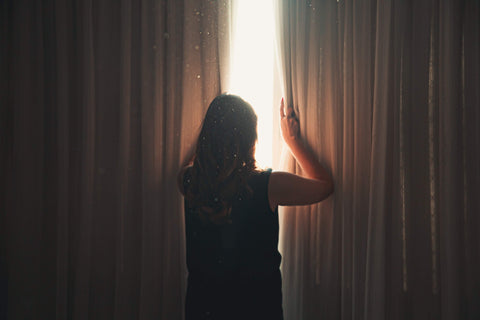
Whether it’s heading out for a morning wander before work or eating breakfast al fresco during the summer months, spending time in the morning soaking up the sun can enhance sleep quality when you head back to bed at night.
This is because, when in the sun, your body produces serotonin, which is then converted to melatonin as you settle down to sleep. And the more time you spend enjoying the morning sunshine, the better your body gets at controlling melatonin levels. As a result, you may begin to see reductions in levels of anxiety at night.
Limit power naps to 20 minutes
There’s no doubting that a quick power nap can be extremely beneficial in boosting alertness, especially if you’re feeling a little lethargic throughout the day. But it’s important to ensure you’re not sleeping for more than 20 minutes at a time, to get the full benefit out of your napping.
Laying for longer than 20 minutes can mean you wake during a deeper stage of your sleep cycle, and risk feeling drowsier and groggier than before. This interrupted sleep cycle can impact your mood and contribute to triggering sleep anxiety when you finally settle down for the night.
Follow a consistent bedtime routine
Bad anxiety at night can heavily affect your sleeping pattern, leaving you feeling exhausted and unable to concentrate your mind throughout the day – which can then perpetuate the problem the following evening.
One simple way to try and combat this is establishing a clear and consistent night time routine. Not only will the familiarity of following regular patterns help your mind to relax and calm down, but your internal body clock will subconsciously help you learn how to fall asleep when anxious.
When setting out your routine, though, take things at your own pace or you risk overwhelming yourself by worrying about each step, which can potentially trigger further sleep anxiety.
Quit smoking
It’s no secret that smoking can have a detrimental impact on your physical health, linked to cancer, heart disease, and lung disease, but did you know that the nicotine found in cigarettes is also a stimulant that can make you feel more awake?
This means smoking during the day can leave your mind feeling active for longer at night and drastically disrupt your sleep pattern. If you’re a smoker and struggling with sleep anxiety, consider low-nicotine alternatives, or quitting the habit altogether.
Consider replacing your current pillows
Trying to fall asleep at the end of a busy day can feel infinitely more difficult if your bedding is uncomfortable and ill-prepared to help you doze off into a cosy slumber. Your pillows are particularly important, and should offer sufficient support to your neck and provide a cool place to rest your head.
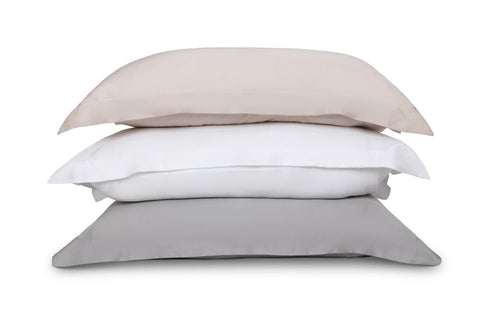
Shop Ethical Bedding's Eucalyptus Silk Pillowcases
If you’re suffering from sleep anxiety, your pillows could be having a bigger impact than you realise; you may well find that your sleeping struggles and stresses are reduced by choosing the right bedding. So, consider whether your current pillows and pillowcases are up to scratch or if they’re contributing to the problem and you need to invest in more effective bedding.
Go for a breathable duvet
Sleeping difficulty sometimes comes from feeling too warm at night and your body overheating and struggling to settle, which can often lead to worry and panic – and sometimes spiral into anxiety. So it’s crucial to choose the correct duvet tog for complete comfort.
Not only will cool bedding and a breathable duvet set better-regulate body temperature, but an increasingly relaxed setting can also help to reduce stress levels and calm your sleep anxiety.
To summarise, recurring bad anxiety at night can quickly turn into a big problem that leaves you feeling exhausted during the day, and can make concentrating on even the simplest tasks a mammoth challenge. And when you do get home, you can find yourself filled with dread at the thought of trying to get back to sleep and repeating the negative cycle.
As such, it’s important to address your sleep anxiety as soon as possible, to break the vicious loop and get your body the rest it needs to function properly. Your bedding plays a huge part in your night time comfort, so consider the benefits of soft and silky sheets and duvet covers, and how they can help you effortlessly slip into the land of nod.
For even more expert insight from our passionate sleep experts, check out the latest from us over on our blog.
